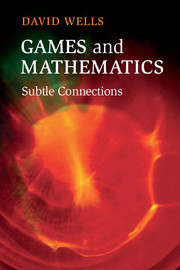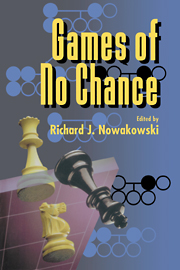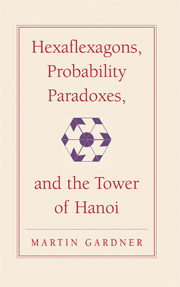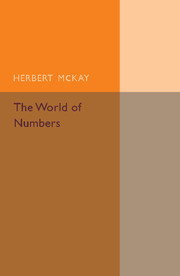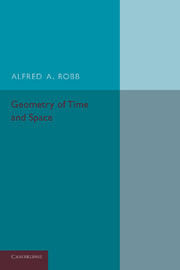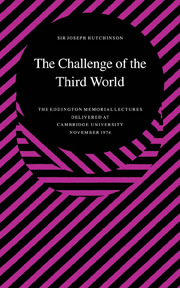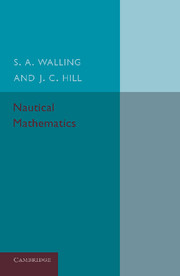Games and Mathematics
Subtle Connections
£22.99
- Author: David Wells
- Date Published: October 2012
- availability: Available
- format: Paperback
- isbn: 9781107690912
£
22.99
Paperback
Other available formats:
Hardback, eBook
Looking for an inspection copy?
This title is not currently available on inspection
-
The appeal of games and puzzles is timeless and universal. In this unique book, David Wells explores the fascinating connections between games and mathematics, proving that mathematics is not just about tedious calculation but imagination, insight and intuition. The first part of the book introduces games, puzzles and mathematical recreations, including knight tours on a chessboard. The second part explains how thinking about playing games can mirror the thinking of a mathematician, using scientific investigation, tactics and strategy, and sharp observation. Finally the author considers game-like features found in a wide range of human behaviours, illuminating the role of mathematics and helping to explain why it exists at all. This thought-provoking book is perfect for anyone with a thirst for mathematics and its hidden beauty; a good high school grounding in mathematics is all the background that is required, and the puzzles and games will suit pupils from 14 years.
Read more- Discover fascinating connections between games and mathematics
- Gives a unique insight into what mathematics is all about
- Mathematical puzzles and problems suit students from 14 years and beyond
Reviews & endorsements
'One of the wellsprings out of which the discipline of mathematics has developed is human delight in intellectual play, manifest in the ubiquity of abstract games across millennia and cultures. The author of this fascinating book is expert in both domains, and in the art of clearly explaining significant aspects of mathematics in ways both accessible to non-experts and illuminating to experts. Through a delightfully rich variety of historical and multicultural examples, he unveils the intimate relationship between abstract games and mathematics as the study of structures, and, in so doing, illuminates much more about mathematical behaviour and cognition. At a time when too much of mathematics education in school seems designed to squeeze out every last drop of playfulness, we are reminded that mathematics can, and should, be an intellectual playground.' Brian Greer, Portland State University
See more reviews'This is a very approachable yet erudite book. Wells' game is to turn Plato's theory of forms on its head: instead of starting with physical examples and imagining their ideal forms, we should take our cue from the abstract laws and intuitions of games. Chess pieces are defined by their powers rather than their physical forms, and so are many situations in mathematics … The book illustrates this thesis with fascinating context: from Ulam's 'lucky' numbers … to the symmetry of the theorem discovered by Emperor Napoleon and the mathematics which arises in Go, Hex and chess … Games and Mathematics makes an important advance in communicating the nature of mathematics. It contains a profound message for philosophers of mathematics, but all mathematically-inclined readers will find [it] as compelling as Wells' excellent 'Curious and Interesting' books.' Paul Brown, author of Proof: Interesting Activities in Conjecture and Mathematical Proof
'This is no ordinary compilation of recreational problems in mathematics … the text reads well and is something of a page-turner … this is not a mere compilation of problems, but a guided tour, and one would hope that it would reach a wider audience, so the authors' expressed intention, of showing that mathematics is not merely computation, but actually foremost an imaginative play, should become effective … All in all this could be a delightful volume in every aspect and I find myself recommending the work … with warmth and enthusiasm and with no qualms.' Ulf Persson, Chalmers University of Technology, Gothenburg
'Complete with a consistent argument and a wealth of supportive references, this is a fun work for both game players and mathematicians to explore. Highly recommended.' J. Johnson, Choice
Customer reviews
Not yet reviewed
Be the first to review
Review was not posted due to profanity
×Product details
- Date Published: October 2012
- format: Paperback
- isbn: 9781107690912
- length: 255 pages
- dimensions: 229 x 152 x 16 mm
- weight: 0.42kg
- contains: 160 b/w illus.
- availability: Available
Table of Contents
Introduction
Part I. Mathematical recreations and abstract games:
1. Recreations from Euler to Lucas
2. Four abstract games
3. Mathematics and games: mysterious connections
4. Why chess is not mathematics
5. Proving versus checking
Part II. Mathematics: game-like, scientific and perceptual:
6. Game-like mathematics
7. Euclid and the rules of his geometrical game
8. New concepts and new objects
9. Convergent and divergent series
10. Mathematics becomes game-like
11. Maths as science
12. Numbers and sequences
13. Computers and mathematics
14. Mathematics and the sciences
15. Minimum paths from Heron to Feynmann
16. The foundations: perception, imagination and insight
17. Structure
18. Hidden structure, common structure
19. Mathematics and beauty
20. Origins: formality in the everyday world
Bibliography
Index.
Sorry, this resource is locked
Please register or sign in to request access. If you are having problems accessing these resources please email [email protected]
Register Sign in» Proceed
You are now leaving the Cambridge University Press website. Your eBook purchase and download will be completed by our partner www.ebooks.com. Please see the permission section of the www.ebooks.com catalogue page for details of the print & copy limits on our eBooks.
Continue ×Are you sure you want to delete your account?
This cannot be undone.
Thank you for your feedback which will help us improve our service.
If you requested a response, we will make sure to get back to you shortly.
×
